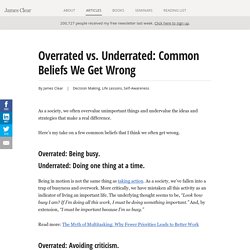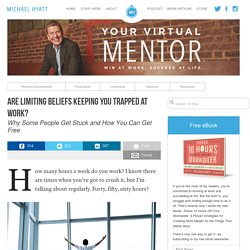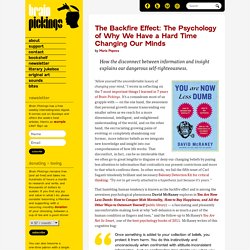

Challenging Automatic Thoughts With Positive Thoughts: Examples & Worksheets (PDF) Overrated vs. Underrated: Common Beliefs We Get Wrong. As a society, we often overvalue unimportant things and undervalue the ideas and strategies that make a real difference.

Here’s my take on a few common beliefs that I think we often get wrong. Overrated: Being busy. Underrated: Doing one thing at a time. Being in motion is not the same thing as taking action. As a society, we’ve fallen into a trap of busyness and overwork. Read more: The Myth of Multitasking: Why Fewer Priorities Leads to Better Work Overrated: Avoiding criticism. Underrated: Sharing unique ideas. You can either be judged because you created something or ignored because you left your greatness inside of you. Read more: Haters and Critics: How to Deal with People Judging You and Your Work Overrated: Unrestricted freedom. Underrated: Carefully designed constraints. Constraints actually increase our skill development rather than restrict it. Read more: The More We Limit Ourselves, the More Resourceful We Become Overrated: Degrees, certifications, and credentials.
Are Limiting Beliefs Keeping You Trapped at Work? How many hours a week do you work?

I know there are times when you’ve got to crush it, but I’m talking about regularly. Forty, fifty, sixty hours? Courtesy of iStock/baona One study I’ve seen says that most professionals actually work more than seventy, given how much time they address business communication on their smart phones. As far as I’m concerned, anything over 55 hours a week is too much. When I say that, I’m surprised at how many people object and say they don’t have a choice. When it comes to people in this predicament, I’ve never run across a situation where someone held a gun to their head. There are many reasons for why people feel stuck in these disempowering situations. They forget they have agency. When I speak about limiting beliefs, I usually tell people to flip the paradigm and replace them empowering truths. No one runs your life unless you let them. Or upgrade to a self-hosted WordPress blog? The Backfire Effect: The Psychology of Why We Have a Hard Time Changing Our Minds.
By Maria Popova How the disconnect between information and insight explains our dangerous self-righteousness.

“Allow yourself the uncomfortable luxury of changing your mind,” I wrote in reflecting on the 7 most important things I learned in 7 years of Brain Pickings. It’s a conundrum most of us grapple with — on the one hand, the awareness that personal growth means transcending our smaller selves as we reach for a more dimensional, intelligent, and enlightened understanding of the world, and on the other hand, the excruciating growing pains of evolving or completely abandoning our former, more inferior beliefs as we integrate new knowledge and insight into our comprehension of how life works. That discomfort, in fact, can be so intolerable that we often go to great lengths to disguise or deny our changing beliefs by paying less attention to information that contradicts our present convictions and more to that which confirms them.
So where does this leave us? Donating = Loving. 12 Toxic Beliefs You Need Out of Your Mind. What we can or can’t do, what we consider possible or impossible, is rarely a function of our strengths or intelligence.

It’s often a function of our beliefs about who we are. “The drummer in our band, Nick, is legally deaf, and has been since he was born. But he can still hear low bass tones and feel the vibrations from the drums and other instruments. Honestly, he’s such an incredible drummer that most people don’t believe he’s deaf. Sometimes I can’t believe it myself.” Those inspiring lines come right out of a live chat conversation I had this morning with Amber, one of our newest course members (she gave me permission to share this with you here). Later on in our chat session, Amber said, “You know, I hate to admit it, but I envy Nick. “What voices,” I asked. “You know, the voices constantly telling me that I’m not good enough, that I don’t have enough, that it’s too late for me, that the naysayers are always right and I’m always wrong, and so forth,” she said.
Afterthoughts Your turn… 8 Toxic Beliefs Most People Think Are Normal. It’s not the circumstances of our lives that shape us, but our beliefs about what those circumstances mean.

When I was in my late teens and early twenties, I had tunnel vision and expected life to be a certain way. I studied my failures until I lost sight of my successes. I surrendered my dreams to feel a sense of comfort. I held tight to my fears and shielded myself from love and happiness by refusing to put myself out there. And as I did all of this, I sat back and wondered why life was so miserable. Obviously, I was very lost. As a veteran life coach who has now spent the better part of a decade coaching thousands of people online and offline, I realize that many of the toxic beliefs I struggled with earlier in life are actually quite common. The present is indicative of the future. – When things aren’t going well there’s a tendency to extrapolate and assume the future holds more of the same.
The floor is yours… So, which of these toxic beliefs sometimes sneak up on you? Related. Schema. Rationalization. Negative Thoughts. The Unknowers. Socratic Questioning.